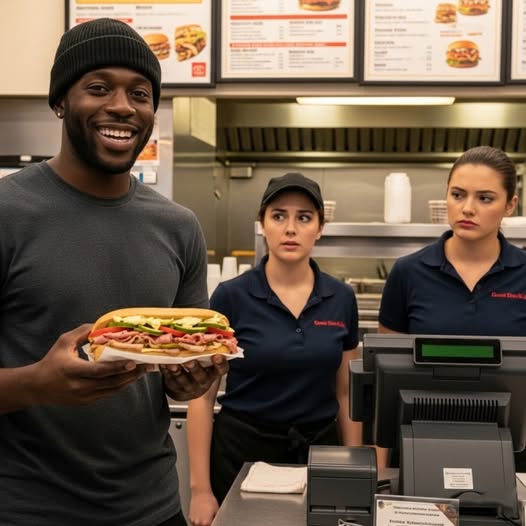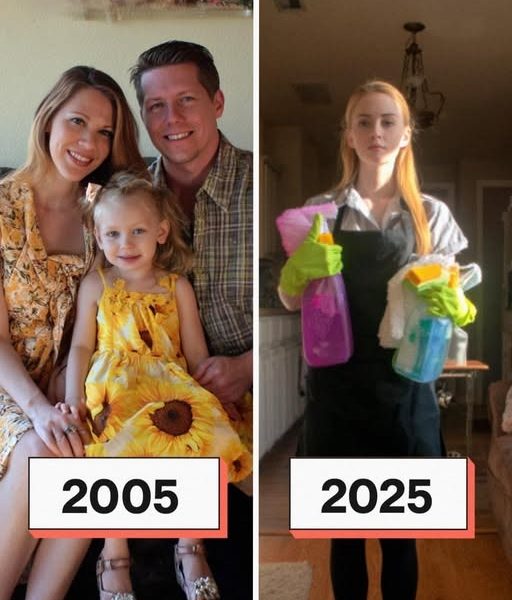Ellis Eats Diner owner Jordan Ellis emerged from his black SUV on a chilly Monday morning, dressed in jeans, a faded hoodie, and a knit cap pulled low over his brow.
He usually wore well-tailored clothes and shiny shoes, but today he appeared to be a typical middle-aged man—some may even say homeless. And he wanted precisely that.
Jordan became a millionaire on his own. In just ten years, his café had expanded from a tiny food truck to a citywide franchise.
However, complaints about slow service, unfriendly employees, and reports of subpar customer handling had only begun to come in. Online reviews that had formerly been five stars have devolved into irate tirades.
Jordan made the decision to visit his own company as an ordinary guy, something he hadn’t done in years, rather than sending inspectors or adding more cameras.
He chose his original downtown location, where his mother used to assist with pie baking. He could hear early risers talking and automobiles humming as he crossed the street. His heartbeat accelerated as the aroma of sizzling bacon filled the air.
He entered and saw the checkerboard floors and red booths he knew so well. The faces had changed, but not much else.
There were two cashiers behind the counter. One was a young, slender woman with a pink apron who was typing on her phone and chewing gum noisily. Denise, the other, appeared worn out, heavier, and older. Neither woman saw him enter.
He waited for perhaps 30 seconds. No salutations. No grin. Nothing.
“Next!” Without even looking up, Denise finally let out a bark.
Jordan moved forward. “Good morning,” he murmured softly.
Denise inspected him briefly, her gaze resting on his rumpled sweatshirt and beat-up footwear. “Oh, I see. What are you looking for?
“Please give me a black coffee and a bacon, egg, and cheese sandwich.”
With a heavy sigh, Denise tapped the tablet and murmured, “Seven-fifty,” without emotion.
Jordan gave her a ten-dollar cash that was crumpled. Without saying a word, she grabbed it, punched in the sale, and slapped the change onto the counter.
After getting his coffee, he sat in a booth in the corner and observed in silence. Although it was crowded, the employees were worn out and negligent.
An order had to be repeated three times by a mother of two toddlers. An elderly guy who inquired about a senior discount was quickly dismissed. A cook swore loudly enough for everyone to hear after dropping a tray.
Jordan’s stomach tightened when he heard something else.
“Did you see that guy who ordered the sandwich?” asked the young cashier with the pink apron, leaning in Denise’s direction. He has the odor of someone who has been sleeping in the underground.
Denise chuckled. “You know what I mean? I mistook us for a diner rather than a refuge. Observe his attempt to request more bacon as if he could afford it.
They both chuckled.
Jordan’s knuckles became white as his fingers clenched around his coffee cup. He was concerned by the connotation of the insult more than the insult itself. Customers—the exact individuals his diner was supposed to serve—were being made fun of by his own staff.
He created this space for families, working people, and anyone else attempting to make ends meet. They were now being treated with disdain by his employees.
While waiting for his order, a man wearing a construction uniform entered and requested a cup of water. Denise appeared irritated. She yelled, “Don’t stay if you’re not buying anything else.”
That was it.
Jordan went to the counter while still holding his lunch.
Neither woman raised her head.
“Pardon me,” he said in a composed yet forceful tone.
Denise gave an eye roll. “Customer service is listed on the receipt, sir, if you have a complaint.”
Jordan stated in a level voice, “I don’t need the number.” “I only have one query. Do you treat everyone this way, or just those who don’t appear to be wealthy?
Denise blinked. “What?”
The youthful cashier raised her voice. “There was nothing wrong with us—”
“Did you do anything incorrectly?” Jordan said it again, his voice a little higher. “You made fun of me behind my back because of my appearance. Then you treated a different customer as though he were less important than you. Your living room is not here. This is a restaurant—my restaurant.
The two women froze. Denise parted her lips but kept them shut.
He took off his knit hood and cap and introduced himself as Jordan Ellis. “This place is mine.”
There was silence in the diner. Some patrons turned to gaze. From the kitchen window, the cook at the rear peered out.
The young woman muttered, “No way.”
“Definitely,” Jordan replied. “This diner was founded by me myself. This is where my mother used to prepare pies.
We created it with everyone in mind, including construction workers, the elderly, parents of young children, and those simply trying to make ends meet. You have no authority to determine who is deserving of respect.
Denise’s face went white. The young lady let her phone fall.
“Allow me to explain—” Denise started.
Jordan cut in, “No.” “I’ve had enough. The cameras have also done so.
He gave the tiny security camera in the corner a nod. “Those microphones? Yes, they are able to detect sound. Your entire speech is captured on tape. Furthermore, this is not the first instance.
Ruben, the manager, emerged from the kitchen at that very moment, appearing astonished. “Mr. Ellis?
“Hello, Ruben,” said Jordan. “We must speak.”
Ruben gave a silent nod.
Jordan faced the cashiers once more. “You are both suspended, with immediate effect. After retraining, Ruben will determine whether or not you come back.
I’ll be working behind the counter today in the meanwhile. Watch me if you want to see how to treat consumers.
Jordan remained unflappable as the young woman’s eyes began to well up with tears. “Don’t cry because you were apprehended. Modify since you’re sorry.
Heads bowed, they marched out in silence. Jordan made a fresh cup of coffee, put on an apron, stepped behind the counter, and carried it to the construction worker.
“Hi, dude,” he said politely. The house has this one. I appreciate your patience.
The man blinked. “You’re the owner, right?”
“Yes,” Jordan replied. Additionally, I apologize for what transpired. This eatery does not stand for that.
Jordan worked the counter himself for the next hour. He smiled as he greeted each customer, filled coffee before anyone asked, cleaned up napkins from the floor, assisted a mother carrying her tray while her toddler complained, and chatted with the cook.
Since 2016, Ms. Thompson has been a regular customer, and he made sure to shake hands with her.
People began to mutter, “Is that him?” A few took pictures. With a smile, an older guy remarked softly, “I wish more bosses did what you’re doing.”
Jordan went outside to take a break about midday. The sky was clear and brilliant. With a mixture of pride and disappointment, he gazed at the diner. The company had expanded, but its principles had changed in the process.
He took out his phone and texted HR, saying, “New rule: Every employee must work with me for one entire shift. No exclusions.
He then returned inside, tightened his apron a bit, and grinned as he took the next order.


